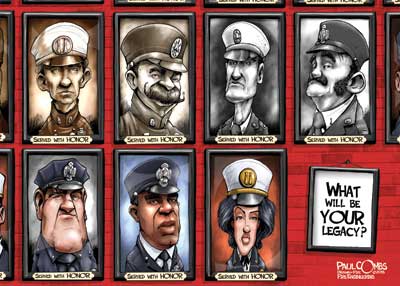Dispatchers are sleep-deprived also
I enjoy reading Fire Engineering. In the February issue, there is a very good article by Katie Vandale (“Sleep Deprivation in EMS,” fireEMS). Why are dispatchers or communications never mentioned or included in critical services of public safety? Are we not the first link in the whole process? Our center works 12-hour shifts. We are very short-staffed, and our run load for “dispatched” runs was more than 143,000 last year. We are dedicated to our jobs and work many hours of overtime to keep our center staffed. We not only deal with the public but also with firefighters, medics, and police and talk on the phone and radio while typing all information in the runs. I have saved lives with CPR instructions over the phone, brought new life into the world over the phone, and heard a mother’s blood-curdling scream while her son took his own life with a gun over the phone-all the while keeping those on the street safe. I have one day during the whole month of March off where I am not working overtime or on call. Maybe I can sleep that day.
Kimberly Lang
Communications
Indianapolis (IN) Fire Department
The new recruit
The fire service is ever changing. We always have new policies, new procedures, new technology, and the newest of firefighters. The days of new recruits coming into the station with strong trade backgrounds such as carpenters, electricians, and mechanics are few and far between. The senior members and officers of our departments have to adapt to our new brothers and sisters. We have to embrace their background in electronics and gaming. The fire service is evolving into simulation-based training such as blue card incident command. This program is completely Web-based, with the final portion being completed in simulators. We have to accept that most of the new recruits have been born into the world of computerized fire apparatus, fuel-injected automobiles, and thermal imaging cameras.
We cannot assume that when we ask new recruits to hook up an extrication tool or change a blade on a saw that they will be proficient in doing so. We have to challenge ourselves and adapt to their environment, which means changing our mindset to embrace the newest technology. We have to introduce our new firefighters to basic mechanics and mechanical theory. They have to understand how the apparatus and equipment work and how to troubleshoot the many problems that could occur at emergency scenes. The new-generation firefighter often looks to “someone else” to correct basic problems. We cannot let this happen. We have to instill the values our mentors instilled in us. We are firefighters; we are the people the world looks to when it comes to solving problems.
When new firefighters come to us with basic problems, we have to be able to understand that they may not truly understand why the problem is occurring. We have to get out of the mindset of saying “That’s stupid” or “You are dumb” for not understanding the problem. When this is occurs, people start to shut down and do not want to ask for help. We have an obligation to these men and women to make them understand the fire service. This reminds me of the saying, “Garbage in/garbage out.” If we feed our new firefighters a bunch of garbage, they will give us a bunch of garbage back. The fire service cannot afford this; the men and women who came before us set the foundation for all of us. We owe these people our careers for showing us the way in the fire service. Think about that old crabby captain making you drill on the same hose load time and time again and that “old timer” who wanted to tell you a story about a call. They were giving us their completed part of the fire service foundation. I believe we are still working on the fire service foundation and are making great strides to start building the upper stories.
The days of the recruit adapting to the fire service we once knew are fading fast. When the senior members started, we had fire apparatus that was mostly mechanical, self-contained breathing apparatus that did not have computer systems, and fires that did not burn as hot. We need to continue training the new recruits and having our new recruits train us. Embracing our new recruits will allow the fire service to flourish with the foundations of yesteryear and the technological advances of today. This combination will allow the men and women of the fire service to competently rise to any challenge.
Thomas J. Wendt
Chief
Dixmoor (IL) Fire Department

Fire Engineering Archives

